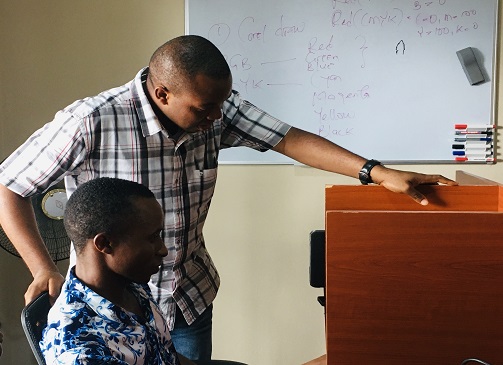
Computer Literacy Programs: Bridging the Digital Divide
Computer literacy programs are essential in today’s technology-driven world, where digital skills are crucial for personal and professional success. The Iwukem Development Foundation (TIDF) is dedicated to bridging the digital divide through comprehensive digital literacy courses that empower individuals with essential digital skills. These programs aim to enhance participants’ ability to use technology effectively, improving their quality of life and opening up new opportunities. This article explores the significance of computer literacy programs, their benefits, and how TIDF’s initiatives substantially impact communities.
The Importance of Computer Literacy Programs
Computer literacy programs are vital for ensuring that individuals can navigate the increasingly digital world. In an era where technology permeates every aspect of life, from education to employment, having basic computer skills is no longer optional. TIDF’s Digital literacy courses address this need by providing foundational knowledge in using computers, software applications, and internet tools. By participating in these programs, individuals gain the skills needed to perform everyday tasks, access information, and communicate effectively in a digital environment.
Enhancing Employment Opportunities
Computer literacy programs play a significant role in enhancing employment opportunities for individuals. In today’s job market, proficiency in computer skills is often a prerequisite for many positions. TIDF’s Digital literacy courses equip participants with essential skills such as typing, using office applications, and managing digital communications. These skills are highly valued by employers and can significantly improve job prospects. Additionally, digital literacy courses often include training in digital job-search strategies, such as creating resumes and applying for jobs online, further boosting employability.
Empowering Communities
Computer literacy programs have a profound impact on communities by increasing digital inclusion and promoting equitable access to technology. TIDF’s Digital literacy courses are designed to reach underserved and marginalised groups, ensuring that everyone has the opportunity to gain digital skills. By providing access to computers and internet training, these programs help bridge the digital divide and enable individuals to participate more fully in the digital economy. As more people acquire computer skills, communities benefit from increased connectivity, improved access to information, and enhanced overall development.
The Benefits of Computer Literacy Programs for Personal Development
Computer literacy programs contribute significantly to personal development by fostering critical thinking, problem-solving, and digital creativity. TIDF’s Digital literacy courses go beyond teaching basic computer operations; they also include training in using digital tools for personal growth and learning. Participants learn how to use educational software, access online resources, and engage in digital communication. These skills not only improve personal efficiency but also empower individuals to pursue lifelong learning and stay informed about various topics.
Overcoming Challenges in Computer Literacy Programs
Computer literacy programs often face challenges, such as limited access to technology and varying levels of prior knowledge among participants. TIDF addresses these challenges by providing resources such as computer labs, internet access, and experienced instructors. The Digital literacy courses are tailored to accommodate different learning needs and levels of expertise. Additionally, TIDF offers ongoing support and resources to ensure that participants can continue to develop their skills beyond the initial training. By addressing these challenges, TIDF ensures that its digital literacy courses are effective and inclusive.
The Role of Digital Literacy Courses in Education
Computer literacy programs play a crucial role in modern education by integrating technology into the learning process. TIDF’s Digital literacy courses support educational institutions by providing training for students and teachers alike. These programs help students develop the digital skills needed for academic success, such as researching information online, using educational software, and participating in virtual classrooms. For teachers, digital literacy courses offer training in using technology to enhance teaching methods and engage students. By incorporating technology into education, TIDF’s programs contribute to a more effective and interactive learning environment.
Future Trends
Computer literacy programs are evolving to keep pace with technological advancements and changing needs. TIDF is committed to staying at the forefront of these trends by continuously updating its Digital literacy courses to include emerging technologies and digital tools. Future trends may include training in areas such as cybersecurity, artificial intelligence, and data analysis. By incorporating these advanced topics into its programs, TIDF ensures that participants are equipped with the latest skills and knowledge needed to thrive in an ever-changing digital landscape.
Success Stories from Computer Literacy Programs
Computer literacy programs have a transformative impact on individuals, as demonstrated by numerous success stories. TIDF’s Digital literacy courses have enabled participants to achieve significant milestones, such as securing employment, pursuing further education, and starting their businesses. These success stories highlight the effectiveness of the programs and the positive changes they bring about in participants’ lives. By sharing these stories, TIDF showcases the tangible benefits of Digital literacy courses and inspires others to take advantage of the opportunities offered.
Conclusion
Computer literacy programs are a cornerstone of digital inclusion and empowerment in the modern world. The Iwukem Development Foundation’s commitment to offering comprehensive Digital literacy courses underscores its dedication to improving lives through technology. By providing essential digital skills, TIDF helps individuals enhance their employment prospects, contribute to community development, and achieve personal growth. As technology continues to advance, the importance of digital literacy courses will only increase. TIDF remains focused on expanding and improving its programs to ensure that everyone has the opportunity to succeed in the digital age.